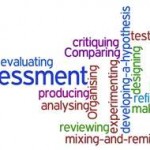 Yesterday we were fortunate to have Professor Sophie Sparrow of the University of New Hampshire School of Law speak to the law school faculty. Professor Sparrow’s talk was entitled “What Have They Learned? Assessing Law Students.”
Yesterday we were fortunate to have Professor Sophie Sparrow of the University of New Hampshire School of Law speak to the law school faculty. Professor Sparrow’s talk was entitled “What Have They Learned? Assessing Law Students.”
Professor Sparrow began by noting that the term assessment has multiple meanings. Among other definitions, assessment can be a deep approach to learning and the process of feedback, or it can be the instrument or evidence of teaching.
Regardless of how assessment is defined (and Professor Sparrow recommends not getting too bogged down in the specific vocabulary), the key to assessment is to make it sustainable and to embed assessment in what is already happening in the class.
The assessment cycle consists of the following steps: 1) articulate the student learning goals and objectives, 2) gather information about how well students are learning (outcomes), 3) give feedback and interpret information through means like rubrics, and 4) use information to improve student learning.
Professor Sparrow showed a diagram of an inverted triangle reflecting how students retain material they learned 24 hours earlier. The highest rate of retention occurs when a student speaks and does something with the material (90%), followed by speaking (70%), hearing and seeing (50%), seeing (30%), hearing (20%), and reading (10%).
At the end of her presentation, Professor Sparrow offered some useful techniques for in-class assessment. The first is the minute paper, where a student writes for a minute on a concept a professor wants to assess. By collecting these minute papers, a professor can quickly discern whether students are grasping a concept. Another technique is to ask students to do an assignment outside of class, and then to have students swap assignments in class to evaluate their assignments. This technique works best when a professor provides a scoring sheet or other rubric to follow, and it can be helpful to offer sample answers. Finally, intermittent short answer or multiple choice quizzes provide fast feedback to both professors and students.

Sounds like an interesting conversation. I think assessment in academic settings can be confused with grades and evaluation. Assessing learning throughout the semester really helps both students and faculty alike and it sounds like Professor Sparrow had some terrific ideas. As a student, I like being able to gauge where I am at with the materials along the way and techniques listed above sound quite helpful.